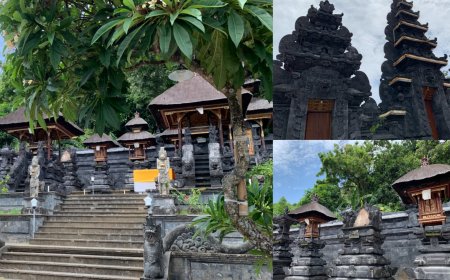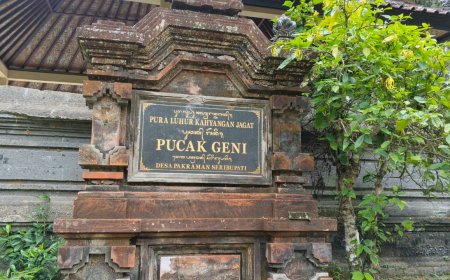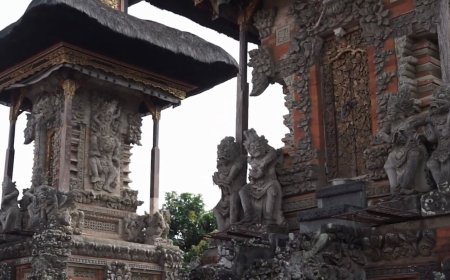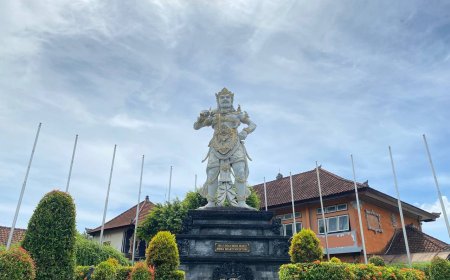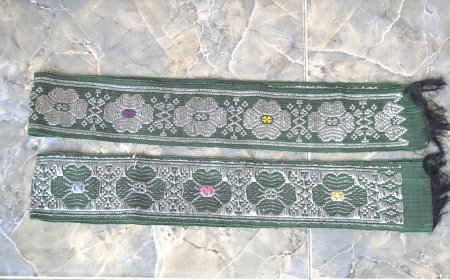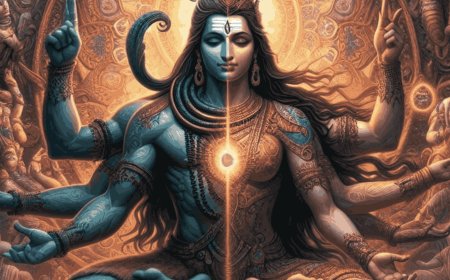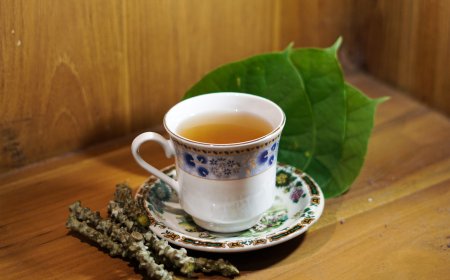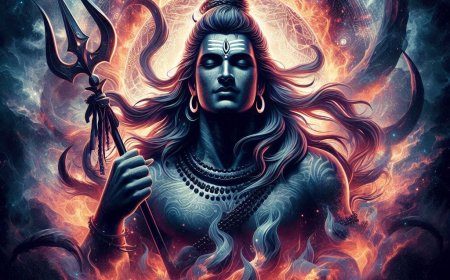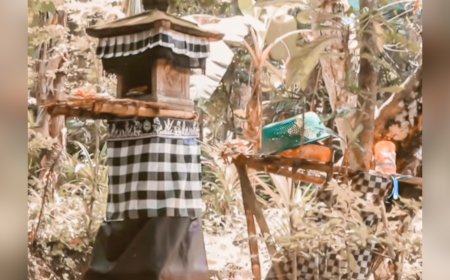Adiparwa: From Brotherhood to Rivalry in the Kuru Dynasty
Adiparwa is the opening part of the epic Mahabharata that begins the heroic journey of the Bharata Dynasty. Starting with King Janamejaya listening to the story of his ancestors, we are taken to the origins of the two great bloodlines—the Pandavas and the Kauravas. Adiparwa also narrates the births of the Pandavas and the Kauravas, leading to the early sparks of hatred between them, which would eventually fuel the great civil war, the Bharatayudha.
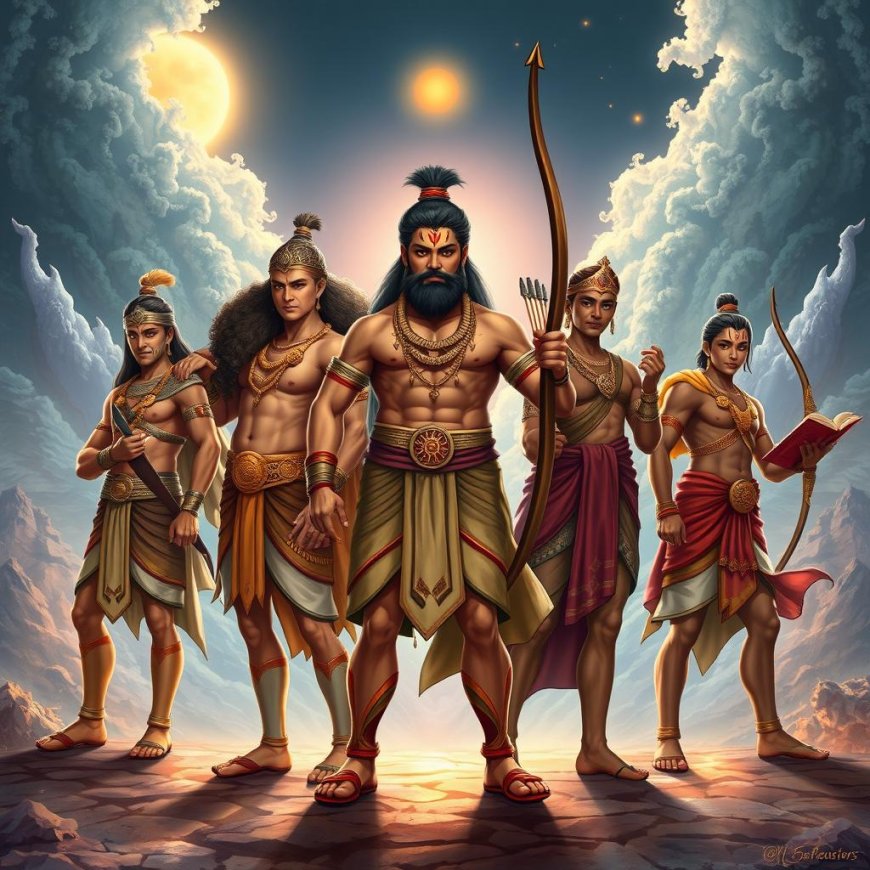
The story begins with King Janamejaya conducting a serpent sacrifice ceremony to avenge the death of his father, King Parikshit, who had died from a snakebite inflicted by the naga Taksaka. However, during the ceremony, messengers from the naga Taksaka pleaded with King Janamejaya to cancel the sacrifice. They requested mercy and explained that revenge would not bring back his father. After reflecting on their plea, King Janamejaya ultimately canceled the ceremony, demonstrating greater wisdom and compassion.
Sage Wesampayana Tells the Story (Source: Personal Collection)
King Janamejaya felt disheartened because his ceremony did not go as hoped and he sensed a deficiency in its execution. To address his sorrow and gain deeper understanding of his ancestors, he requested Sage Vyasa to recount the tales of his lineage, including the stories of the Kauravas and Pandavas. However, Sage Vyasa declined the request due to his very busy schedule. As an alternative, Vyasa recommended his disciple, Sage Vaisampayana, to narrate these stories to King Janamejaya.
The Bharata family lineage begins with King Yayati, a powerful and influential ruler. Yayati had two main queens: Dewayani and Sarmishta. From his marriage to Dewayani, he had two sons, Yadu and Turvasu. Yadu later became known as the ancestor of the Yadava clan.
King Yayati and His Sons (Source: Personal Collection)
From his marriage to Sarmishta, Yayati had three sons: Anu, Druhyu, and Puru. These three sons established important branches of the Bharata family. The descendants of Anu are known as the Anuwas, while the descendants of Druhyu formed the Druhyus. Puru, the most notable son, became the ancestor of the Puravas, who played a key role in the history of the Bharata dynasty.
It is told that one day, when King Santanu was hunting along the riverbank, he encountered a woman of extraordinary beauty. She was Dewi Gangga.
The Encounter of Prabu Santanu and Goddess Gangga (Source: Personal Collection)
Enchanted by the extraordinary beauty of Goddess Ganga, King Santanu, a wise and powerful ruler, could not contain the turmoil in his heart. He fell in love at first sight and immediately expressed his desire to make Goddess Ganga his queen. Calmly, Goddess Ganga accepted his proposal but imposed an unusual condition. She asked King Santanu to promise that he would never question or forbid anything she did, particularly concerning their future children. Overwhelmed by his passionate love, King Santanu was unable to refuse.
Dewi Gangga Drowned Her Son (Source: Personal Collection)
Shortly after their marriage, Goddess Ganga and King Santanu were blessed with a son. However, the joy that should have accompanied the birth was swiftly overshadowed when Goddess Ganga, with cold detachment, took their firstborn to the River Ganga and drowned him without hesitation. King Santanu, shocked and heartbroken, remembered the vow he had made not to question or oppose his wife’s actions, even though his inner self screamed in agony. He could only restrain himself with profound sorrow.
However, when Goddess Ganga became pregnant with their eighth child, King Santanu's patience reached its limit. After years of enduring sorrow and confusion, he could no longer remain silent. As Goddess Ganga prepared to perform the same act with their eighth son, King Santanu decisively intervened. For the first time, he broke his promise. With a voice filled with tension, he asked, "Why are you doing this? What is the reason behind the deaths of our children?"
Goddess Ganga, with a calm but sorrowful demeanor, explained the reason behind her seemingly cruel actions. The children she had been drowning were not ordinary mortals but the Astabasu—eight celestial beings cursed to be born as humans. They had been punished for a grave sin: stealing the sacred cattle of Sage Vasishtha. Goddess Ganga was drowning her sons because she wished to free their souls so they could swiftly return to heaven and be liberated from their earthly curse.
Goddess Gangga and Dewabrata (Source: Personal Collection)
Sixteen years had passed since Goddess Ganga's departure. One day, as King Santanu was walking along the banks of the River Ganga, his gaze was suddenly drawn to an extraordinary young boy. The boy, with remarkable agility and strength, was using hundreds of arrows to divert the powerful flow of the river. The boy’s skill and prowess in archery left King Santanu spellbound.
Several years passed, and King Santanu and Dewabrata lived happily. One day, rumors spread throughout Hastinapura, eventually reaching King Santanu's ears. It was said that a fragrant aroma had spread around the Yamuna River. Curious about the truth of this, King Santanu decided to investigate the matter himself. While walking along the banks of the Yamuna River, King Santanu was suddenly enveloped by a captivatingly sweet scent. There, he saw a young woman of extraordinary beauty, rowing a boat. The girl was Satyavati, the daughter of a fisherman, renowned for her beauty and simplicity.
Day by day, King Santanu sank deeper into sorrow. He no longer had the enthusiasm to rule his kingdom with the vigor he once had. The thoughts of Satyavati caused him so much stress that he eventually fell ill. His health deteriorated, and his once vibrant and cheerful face now appeared pale and weary. The king who was once mighty now seemed like a mere shadow of himself, tormented by a love he could not fulfill.
Dewabrata The One With the Terrible Oath (Source: Personal Collection)
With a resolute heart, Devabrata agreed to the condition. To ensure there would be no future disputes between his own descendants and those of Satyavati, Devabrata made a formidable vow: he swore to remain celibate and have no children for the rest of his life. With this vow, he sacrificed his claim to the throne and his personal life, all to bring happiness to his father.The vow was so extraordinary that everyone who heard it was deeply moved. Devabrata swore with unwavering determination, and his oath was witnessed by the gods. This vow earned him the name Bhishma, which means "the one with the terrible oath" or "the revered one." His sacrifice became a legendary tale that would be remembered through the ages.
Chitrāngada, the eldest son of King Santanu from his marriage to Satyavati, ascended to the throne of Hastinapura following his father’s death. Inheriting the leadership from King Santanu, Chitrāngada brought a renewed vigor to the kingdom. Under his rule, Hastinapura experienced a period of much-needed peace and stability. The people felt secure and prosperous, and Chitrāngada was known as a wise and just ruler, continuing his late father’s legacy. However, this tranquility was not destined to last.
The Death of Chitranggada (Source: Personal Collection)
One day, a challenge letter arrived for King Chitrāngada, sent by King Chitrāngada of the Gandharvas. The Gandharva king, who bore the same name, felt that there could not be two rulers with the same name, and thus a duel was necessary to determine the rightful Chitrāngada. Chitrāngada accepted the challenge and promptly set out for the banks of the Saraswati River, where the duel was to take place.
At that time, Vichitravirya was still young and not fully prepared to be king. Therefore, he was assisted in ruling Hastinapura by his elder brother, Bhishma. When Vichitravirya came of age, Bhishma sought out the best possible match for him. He succeeded in winning a contest in the Kingdom of Kashi and secured three princesses from Kashi to become Vichitravirya's wives.
Princess Amba, Ambika, dan Ambalika (Source: Personal Collection)
The three princesses from the Kingdom of Kashi that Bhishma secured for Vichitravirya were Princess Amba, Ambika, and Ambalika. All three were known for their beauty and elegance. However, a serious issue arose concerning Princess Amba. Princess Amba refused to accompany Bhishma because she was emotionally committed to King Salya. Amba had previously promised to marry King Salya and felt deeply loyal to that promise. Despite Bhishma having won the contest and secured the three princesses for Vichitravirya, Princess Amba remained steadfast in her decision not to leave King Salya. After Amba's refusal, Bhishma brought the three princesses back to his kingdom. However, the situation became more complicated when King Salya refused to accept Princess Amba back. King Salya felt deeply humiliated after Bhishma had defeated him in the contest. This sense of disappointment and shame led King Salya to reject Amba, despite his prior promise to marry her.
Upon hearing King Salya's decision to reject her, Princess Amba felt immense anger and disappointment. She perceived Bhishma as the main cause of her ruined happiness, believing that he had destroyed her hopes of uniting with King Salya. With deep anger and sorrow, Princess Amba vowed to seek revenge. She cursed Bhishma and swore that she herself would be the cause of Bhishma's death in his next life. In her anger, Amba chose to jump into the fire.
The Wedding of Wicitrawirya with Putri Ambika and Ambalika (Source: Personal Collection)
The marriage of Vichitravirya to Princess Ambika and Princess Ambalika was celebrated with great festivity. Unfortunately, this marriage lasted only seven years. Vichitravirya passed away due to a lung disease, and during his lifetime, he had no offspring.
Sage Vyasa then visited the two wives of Vichitravirya, Ambika and Ambalika, to bless them with sons. As part of the process, Sage Vyasa requested that Ambika and Ambalika visit him alone and alternately. Ambika, being the first, came to meet Sage Vyasa.
Ambika Closed Her Eyes Tightly During The Process (Source: Personal Collection)
Seeing that Ambika's son had been born blind due to her closing her eyes during the process, Ambalika made a conscious effort to keep her eyes open during her meeting with Sage Vyasa. Although she succeeded in keeping her eyes open, she became pale with fear due to the "extraordinary" appearance of the sage. As a result, her son Pandu was born pale and was said to suffer from anemia, which made him appear unfit to rule the kingdom.
Realizing that neither of her sons was in an ideal condition to become a future king, Satyavati requested that one of them visit Sage Vyasa again to seek additional progeny. However, instead of sending one of her sons, they sent a servant to perform the ritual. The servant performed the ritual with great calmness and precision, which led Sage Vyasa to predict that the servant's child would exhibit noble qualities. Sage Vyasa also declared that the child would be the reincarnation of the god Dharma. The child was named Vidura, who would later become a renowned minister in Hastinapura.
Several years passed, and the sons of Hastinapura grew into adulthood. Due to the condition of the eldest son, Drestarasta was deemed unfit to be king, and thus Pandu, the second son, became the King of Hastinapura. Pandu had two wives, Dewi Kunti and Dewi Madri. One day, while hunting in the forest, he spotted two beautiful deer. He thought of bringing these deer as gifts for his two wives.
The Curse of Rsi Kindama (Source: Personal Collection)
Pandu accurately shot an arrow, but unbeknownst to him, one of the deer he targeted was actually the sage Kindama in the form of a deer, who was engaged in a private moment. The sage, enraged and shocked by the attack during such a personal state, cursed Pandu. The curse declared that Pandu would meet his death whenever he engaged in sexual relations.
In their desperate search for a solution, Kunti remembered a significant boon she had received earlier. Kunti had been granted a powerful mantra by Sage Durvasa. This mantra possessed extraordinary abilities, allowing Kunti to invoke certain deities and conceive children with their divine blessings.
Kunti and Pandu Request Children from the Gods (Source: Personal Collection)
Kunti performed the ritual to invoke the god Yama, and her prayer for a son was granted. Thus, their first son, Yudhishthira, was born. Yudhishthira was known for his wisdom, truthfulness, high moral standards, and forgiving nature.
Kunti then decided to help Madri in obtaining children. Madri performed a ritual and invoked the Ashwini Kumaras, the twin deities known as healers and protectors. The Ashwini Kumaras blessed her with twin sons named Nakula and Sahadeva. Both twins were renowned for their special skills in caring for horses and cattle. Nakula was particularly known for his charming and entertaining personality, as well as his proficiency in swordplay. Sahadeva, like his brother, excelled in the care of horses and cattle, and was also known for his wisdom and strategic acumen.
King Drestarasta eventually married Gandari, the daughter of King Gandhara, who was known as a woman of noble character and deep compassion. To demonstrate her profound love for her blind husband, Gandari made a highly symbolic gesture—she covered her eyes with a cloth so that she, too, would experience the same condition as Drestarasta. This act was a powerful display of her loyalty and sacrifice for her husband.
Gandari and Dresrarasta (Source: Personal Collection)
Gandari really wanted to have a son, and finally she got pregnant. However, after a long pregnancy, her pregnancy did not come. She was jealous of Kunti who already had a child, Yudistira. She hit her womb so that her water broke. However, when the labor process took place, what came out was not a baby, but a lump of flesh. This condition made Gandari feel very sad and confused. Then Drestarasta asked for help from Bagawan Byasa. Bagawan Byasa cut the lump of flesh into 100 pieces and put them in a jar which was left for a year.
After 15 years had passed, Pandu's sons had grown into strong and healthy young men. One day, while Kunti and their children were away from their residence, Pandu and Madri experienced an intimate moment that was not in line with Pandu's curse. True to the curse, Pandu died instantly during the act of intimacy.
Pandu's Cremation (Source: Personal Collection)
Pandu’s passing brought deep sorrow to the entire family, and the grief was felt most intensely by Madri. Overwhelmed with guilt and sorrow over her husband's death, Madri decided to follow the tradition of sati and immolate herself to join Pandu in the afterlife. Before performing the ritual, with great hope, Madri entrusted her two sons, Nakula and Sahadeva, to Kunti, asking her to care for and raise them. Kunti, who deeply loved her own children and now had to care for Madri's as well, accepted the responsibility with full devotion. She promised to care for Nakula and Sahadeva as her own. Afterward, Kunti and her five sons returned to Hastinapura and settled there.
The Pandavas and Kuravas grew up together in the Hastinapura palace, they enjoyed their childhood under the strict yet attentive guidance of Guru Drona. Guru Drona, a highly skilled and wise teacher, instructed them in various skills, from warfare and military strategy to knowledge and sciences. Aswatthama, Guru Drona’s son, also joined in their education, learning alongside the Pandavas and the Kauravas. Additionally, the Pandavas often received valuable lessons and advice from their grandfather, Bhishma, who taught them about morality, dharma, and the responsibilities of being future leaders.
Pandavas Learn from Guru Drona (Source: Personal Collection)
Dhritarashtra, observing his grandchildren’s development, saw great potential in Yudhishthira, Kunti’s son. He believed Yudhishthira had all the qualities needed to become a wise and just king. With this decision, Dhritarashtra intended to nominate Yudhishthira as the future king of Hastinapura.
Laksagreha Palace (Source: Personal Collection)
With deep hatred and jealousy towards the Pandavas, Duryodhana began plotting malicious actions to eliminate the threat posed by his cousins. Duryodhana and the Kauravas believed that they could not seize the throne while the Pandavas were still around, so he decided to employ devious and dangerous tactics.
The Pandavas Escape Through the Tunnel (Source: Personal Collection)
On the night following the celebration held at Laksagraha, Purocana, Duryodhana's agent assigned to guard the place, fell into a deep sleep after eating the food prepared by Kunti. This provided the Pandavas with an opportunity to escape. They quickly took advantage of this chance to flee through the escape tunnel prepared by Widura.
After successfully escaping from Laksagraha, the Pandavas crossed the River Ganges and arrived in the Forest of Hidimba, also known as Hidimbavana. Here, they found refuge and a temporary place to stay. During their time in the forest, Bhima, one of the Pandavas, encountered Hidimbi, a demoness disguised as an ordinary woman.
The Battle of Hidimba and Bima (Source: Private collection)
Then came the fierce battle between Bima and Hidimba. The fight was intense, witnessed directly by Hidimbi. With all his skills and strength, Bima managed to win the battle. After the fight, Bima married Hidimbi, and from their union, a son was born named Gatotkaca. Gatotkaca inherited immense strength from both of his parents. With the mixed blood of a human and a giant, Gatotkaca possessed extraordinary powers. He could fly in the sky without wings and had an incredibly strong and invulnerable body, as tough as iron. Gatotkaca and Hidimbi then settled in Hidimbawana.
One day during their journey, the Pandavas participated in a competition organized by King Drupada in the Kingdom of Panchala. This competition was held to win the hand of Dewi Drupadi. The Pandavas disguised themselves as Brahmins. Many warriors took part in the contest, but none could succeed in the challenge, which was to hit the target perfectly with a bow and arrow.
Arjuna Competes and Win Drupadi (Source: Private collection)
Karna, the King of Anga, who also participated in the competition, managed to hit the target accurately with his arrow. However, Draupadi refused to marry Karna because he was a charioteer's son and belonged to a lower caste.
Upon arriving home, the Pandavas exclaimed, “Mother, we have brought a prize!” Without first seeing what her sons had brought, Kunti responded, “Divide it equally among yourselves.”
Indraprastha Palace (Source: Private collection)
After the fire at Laksagreha, which led to the belief that the Pandavas had perished, they actually returned safely to Hastinapura. Duryodhana, in a state of panic and fearing that the Pandavas would claim their rightful share of the Hastinapura throne, decided to offer them the region of Kandawaprastha as compensation. Kandawaprastha was known to be a barren and infertile area due to the curse of the Rishis.
Seeing this situation, Sri Krishna appealed to Lord Indra for help in improving the condition of the city. Sri Krishna promised Lord Indra that the kingdom would be named Indraprastha in his honor. Subsequently, Lord Indra sent Vishwakarma, the divine architect, to design and build the city. Vishwakarma fertilized the barren land, eliminated diseases, and designed magnificent buildings for the city. Thanks to Vishwakarma's assistance, Indraprastha began to flourish into a large and prosperous city. People from various regions started to arrive and settle in Indraprastha, transforming it into a new center of power and prosperity.
They lived their lives normally, ruling Indraprastha together. Among the five Pandavas, they had made a mutual agreement: whoever disturbed Drupadi when she was with one of the Pandavas would be punished with 12 years of exile. One day, while the Pandavas were ruling the Kingdom of Indraprastha, Arjuna received a report from a priest that his hermitage was being disturbed by giants.
Arjuna Retrieves His Bow in the Room (Source: Private collection)
Arjuna, as a warrior who upholds the principles of dharma, always carries out his duties with full responsibility. However, one day in the kingdom of Indraprastha, an unexpected event occurred. A priest approached Arjuna and reported that his hermitage was being disturbed by demons. In a rush and without much thought, Arjuna hurriedly took his weapon, which was stored in a room, unaware that Yudhishthira, his elder brother, and Draupadi, the shared wife of the Pandavas, were in the room at the time. This was a serious violation, as per the agreement among the Pandavas, anyone who disturbed one of them while they were with Draupadi would be punished with 12 years of exile. Even though this incident happened under urgent circumstances, Arjuna, with great humility, accepted the punishment without protest. He believed that the rules they made must be respected, no matter how difficult. With a heavy heart, Arjuna left Indraprastha and began his period of exile.
Arjuna and Subadra (Source: Private collection)
One of the key stops in his journey was Dwaraka, where Arjuna met Subhadra, the sister of Lord Krishna and Balarama. Arjuna disguised himself as a hermit during his stay in Dwaraka, and during this time, the seeds of love between Arjuna and Subhadra grew. With the blessing of Lord Krishna, their relationship eventually culminated in marriage. Subhadra and Arjuna then returned to Indraprastha, where they were joyfully welcomed, and from this marriage, a son was born who would later become a great hero in the Kurukshetra War-Abhimanyu.
In addition to marrying Subhadra, Arjuna expanded his knowledge in various fields during his exile. He learned new martial arts, war strategies, and the art of using different kinds of weapons. This journey not only sharpened his physical abilities but also enriched his soul with profound experiences. With every step, Arjuna continued to affirm himself as a true warrior, steadfast in his dharma, even when it required sacrificing comfort and togetherness with his family.


